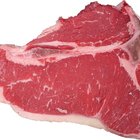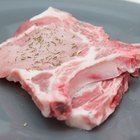
Olive oil does not actually tenderize meat, but it does provide an excellent base for marinades containing protein-dissolving enzymes that do. Make your own marinade using fresh fruits that contain these enzymes or sprinkle on some meat-tenderizing powder that you can buy at your local supermarket. Either way, the olive oil will ensure uniform distribution of your tenderizing agent.
Marinades
Marinades add flavor to the outside of meats. Flavor them with your favorite herbs, spices, garlic and sauces such as steak, soy or barbecue sauce. Add a tenderizing agent, especially to tougher cuts of meat. The toughest cuts come from muscle that gets used the most -- legs, shoulders and rump -- while meat from the abdomen of the animal is the tenderest -- breast, tenderloin and rib-eye.
Mix the marinade to taste and adjust flavors before adding meat. Put the meat in a bowl or small plastic bag and add enough of the marinade to coat the meat on all sides. Marinate the meat in the refrigerator for an hour or two for smaller cuts and for several hours or overnight for larger cuts. Turn the meat periodically to ensure that all sides of the meat come in contact with the marinade.
Fresh Fruit
Fresh fruit, especially the tropical varieties, contains enzymes that relax the protein molecules in meat. This process, called denaturing, is the reason you avoid using fresh pineapple when making fruit-flavored gelatin treats. When fruits are cooked, canned or processed with heat in any way, these protein-dissolving enzymes are destroyed. They add flavor to the marinade but don’t tenderize the meat.
The fresh fruits with the highest concentration of protein-dissolving enzymes include pineapple, papaya, kiwi, mango, guava, figs and ginger root. Use just the juice or puree the fruit before mixing with an olive oil base and complementary flavors.
Packaged Tenderizing Powders
Meat tenderizer products contain powdered forms of these enzymes for a no-fuss way to tenderize meat. Sprinkle them into a flavored olive oil marinade, stir to dissolve and pour the mixture over meat. The olive oil does three things here: it dissolves the enzyme powders, distributes the enzymes evenly and provides body that bonds the meat to the tenderizer. Look for these products in the spice section and meat counter of your favorite supermarket.
Alternatives
Acid is a highly effective meat tenderizer. Marinate fish and seafood in seasoned lime juice for ceviche, a tropical classic often served as an appetizer. Lemon, orange and grapefruit juices tenderize, too, as do vinegar, wine, buttermilk and yogurt. These liquid acids are thin, though, and need the body of the olive oil to keep them in contact with the meat and for even distribution.
Marinade Tips
Start with an olive oil base that will provide body to the marinade, making it just thick enough to cling to the meat long enough for chemical reactions to occur but not so oily that seasonings are overpowered. Taste the marinade and adjust flavors before adding it to raw meat. Reserve used marinade after removing the meat, cook it to a boil and brush it on meat to glaze it while it cooks or to serve it as a sauce.
Never serve used marinade as a sauce without cooking it thoroughly first. For the safest dining, bring the marinade to a full, rolling boil before serving.
Related Articles

What Juices Tenderize Steak?

How to Make a Venison Rub

Can You Tenderize Steak With Milk?

How to Cook London Broil

How to Get Skirt Steak Tender

Ways to Cook Cross Rib Steak

What Do You Put on a Steak Before ...

How to Make Marinade for Roast Beef

Tips to Marinate a T-Bone Steak

How to Slice Round Steak for Jerky

Do You Have to Cook the Chicken After ...

How to Sear Ribs

How to Soak Deer Meat in Baking Soda

Can You Marinate a Pork Shoulder ...

Can You Marinate Boneless Pork Sirloin ...

Does a Dry Rub Meat Tenderizer Need to ...

The Best Way to Smoke Yellowtail

How to Roast Whole Flounder

How to Cook Yak

What Is the Difference in Top Sirloin & ...
Resources
Writer Bio
Sandy Hemphill graduated with honors from Western Culinary Institute, Portland, Oregon, in 1997. She's published a cookbook ("Texas to the Bone") and has a series of cookbooks in development. She writes a web page devoted to cocktails. After seven years of copywriting, she founded iRoar.org, for internet marketing.
Photo Credits
George Doyle/Stockbyte/Getty Images